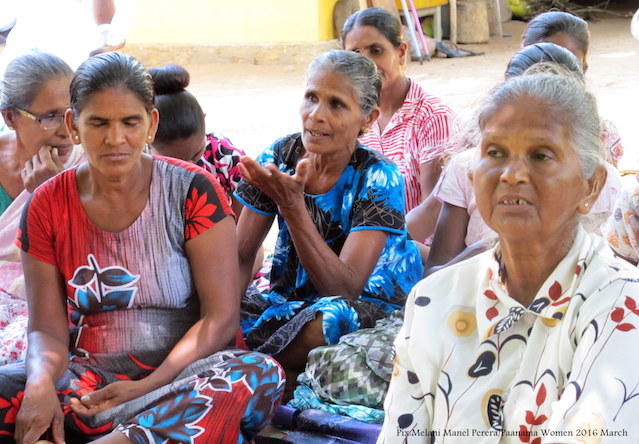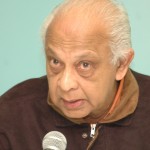Sri Lanka: The Human Rights Crisis In The Tamil North & East – An Appeal For International Intervention

 I am a Sinhalese from the majority community in Sri Lanka. I have campaigned for the past 70 years for the Tamil people to live with equality, dignity, safety and without discrimination. I cannot think of any time in the past seven decades that the outlook for the Tamil people has been more disastrous than it is today.
I am a Sinhalese from the majority community in Sri Lanka. I have campaigned for the past 70 years for the Tamil people to live with equality, dignity, safety and without discrimination. I cannot think of any time in the past seven decades that the outlook for the Tamil people has been more disastrous than it is today.
Sri Lankan (Sinhalese) politicians are simply incapable of addressing the major human rights problems faced by the Tamil people. They do not have the ability, integrity or honesty to see that what has been done to the Tamil people in the North and East is unacceptable.
This publication is being written for circulation at the 37th Sessions of the Human Rights Council in Geneva (27 February – 23 March 2018) so that those who attend the Sessions will be apprised of the major abuse of human rights in the Tamil North and East, and the absolute need for international intervention.
A military/police state in the North and East
The North and East of Sri Lanka are not under the Sri Lankan government but under the Sri Lankan (Sinhalese) military (99% Sinhalese) and the police (95% Sinhalese). It is a military/police state where the military and police can do what they want with no accountability.
16 of the 19 Divisions of the Sri Lankan Army are in the North and East. There were 170,000 members of the military at the end of the armed conflict in 2009. A year later it went up to 200,000 and the next year it was up to 300,000. The ratio of soldiers to civilians the North-East is 1:5, in Vavuniya it is 1:3.
The Adayaalam Centre in Jaffna and PEARL (People for Equality and Relief in Sri Lanka) in Washington, titled ‘Normalising the Abnormal. Militarisation of Mullaitivu’ published in October 2017, says that the ratio of military to civilians in Mullaitivu is 1:2. There is no place in the world which is so highly militarised.
The military and police are responsible for all the serious violations of human rights of the Tamils people in the area.
The writ of the Sri Lankan government does not run in the North and East. As such, international intervention is mandatory for humanitarian reasons. If nothing is done the Tamil people in the area will simply wither away since they have no means of survival – no land to cultivate, no sea to fish, no jobs and unable to set up a business sine all of these have been taken over by the Armed Forces.
If the Tamil people wither away, it is genocide.
The Tamil Tigers have been crushed. The question is the justification for such a massive military presence. Who is the enemy? Since there is no justification, the military must be withdrawn and the police recruited from the local Tamil population. This is imperative and urgent. It will not happen without international pressure.
The military getting involved in non-military activity
The Armed Forces have gone into non-military commercial activity. They are engaged in large scale property development, construction projects and business ventures such as travel agencies, holiday resorts, restaurants and innumerable cafes in the North and East. Some of these holiday resorts have been published by the British Tamils Forum (see below).
This non-military activity is having a serious impact on civilian life and must be stopped. The military has no place in business activity.
The centralisation of power in Colombo must end
Sri Lanka is a British colonial construct that has failed – as have so many colonial constructs.
For hundreds of years there were three separate Kingdoms – a Tamil Kingdom in the North and East, a Kandyan Kingdom in the centre (Kandyan Sinhalese) and a Kotte Kingdom in the South (Low country Sinhalese).
It was the British who in 1833, the Colebrook-Cameron ‘reforms’, unified that which was divided with no consent from the people, and worse still, centralised power in Colombo. This has had a disastrous effect on the country. To make things even worse, when the British left Ceylon in 1948, they handed over the country to the Sinhalese despite serious protests from the Tamils that they feared discrimination at the hands of the Sinhalese. The very least the British could have done was to have left a Federal State for the Tamils.
If what the colonial British did was wrong, what followed after the British left was worse. From Independence (1948), the Sinhalese governments totally isolated the Tamil homelands from all economic development programs undertaken with massive foreign aid from donor countries. As a result, over the past seven decades, while the Sinhalese people and their homelands have prospered and flourished, the Tamil people and their homelands in the North and East have suffered and become the backyard colony of the Sinhalese.
It is essential that all of this is reversed and power to govern is returned to where it was, if there is ever going to be peace and justice in Sri Lanka. This will simply not happen unless there is massive pressure from the international community, especially the aid-givers.
Fear and Insecurity in the Tamil North and East
The overwhelming problem facing the people in the North and East is fear and insecurity. They are justifiably afraid of the Armed Forces, Police, Sinhalese who have been settled there and are supported by the Armed Forces and Police, Tamil paramilitaries working with the government, and, alarmingly, fear of each other. No one is confident that what is told to someone might not be conveyed to someone else for monetary gain.
One such case is described in my book “Sri Lanka: Sexual Violence of Tamils by the Armed Forces”. A prospective asylum seeker who wanted to flee Sri Lanka found that just before he left, the Armed Forces got all the details. This happened over and over again. He then realised that the information was being passed to the Armed Forces by a member of his family for financial gain.
Living in insecure homes is another major problem. Armed Forces and Police can kick the door down (if there is one) and sexually assault those inside – including children. A photograph of one such case is in my book on Sexual Violence.
Until the Armed Forces are removed from the North and East, this fear and uncertainty will remain.
